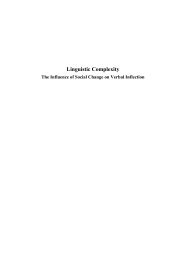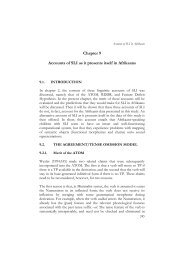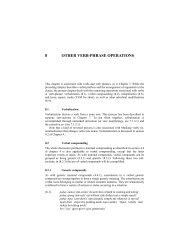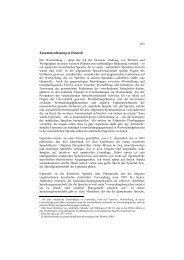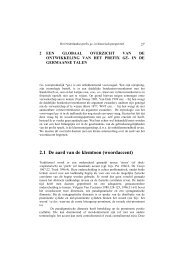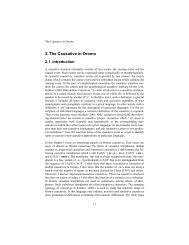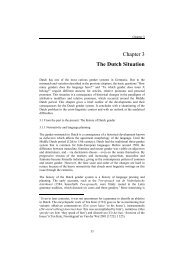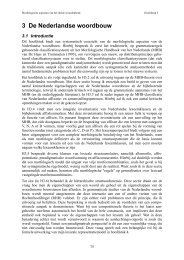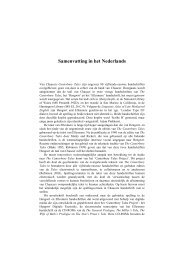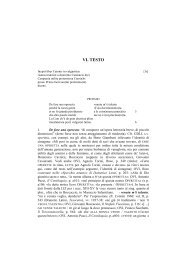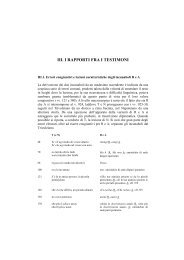chapter 2 stance adverbs qualifying a standpoint - LOT publications
chapter 2 stance adverbs qualifying a standpoint - LOT publications
chapter 2 stance adverbs qualifying a standpoint - LOT publications
Create successful ePaper yourself
Turn your PDF publications into a flip-book with our unique Google optimized e-Paper software.
76<br />
CHAPTER 2<br />
of <strong>qualifying</strong> <strong>standpoint</strong>s does so, as well, but only indirectly. This is because in<br />
the „illocutionary‟ way of <strong>qualifying</strong> the protagonist appears making a comment<br />
about the way the act is performed, but not directly about the commitment to<br />
the propositional content asserted in that act.<br />
2.4 Concluding remarks<br />
In this <strong>chapter</strong>, I have presented the <strong>adverbs</strong> that may constitute the linguistic<br />
realisation of each of the three ways of <strong>qualifying</strong> <strong>standpoint</strong>s distinguished in<br />
Chapter 1. I have chosen to look into the grammatical class of <strong>adverbs</strong> in order<br />
to search for the ones that may be used as the linguistic realisation of the three<br />
ways of <strong>qualifying</strong> <strong>standpoint</strong>s. The reason for this choice is that <strong>adverbs</strong> unlike<br />
other grammatical classes are the most detached both semantically and<br />
syntactically from the core sentence. Of the three main classes of <strong>adverbs</strong> that<br />
can be generally distinguished (circum<strong>stance</strong> <strong>adverbs</strong>, <strong>stance</strong> <strong>adverbs</strong>, linking<br />
<strong>adverbs</strong>), I have narrowed down my search in the group of what Biber et al.<br />
(1999) describe as „<strong>stance</strong> <strong>adverbs</strong>‟. The reason for this is that <strong>stance</strong> <strong>adverbs</strong><br />
are syntactically the most detached (compared to circum<strong>stance</strong> <strong>adverbs</strong>), and<br />
that they add a comment that concerns the content of the utterance in which<br />
they appear rather than suggesting a link between this content and that of other<br />
utterances in the discourse (unlike linking <strong>adverbs</strong>). While the three-part<br />
classification of <strong>stance</strong> <strong>adverbs</strong> that Biber et al. propose is a good starting point,<br />
the specifics of it require certain adjustments, given the interest in<br />
argumentative discourse and more specifically in the function that I take these<br />
<strong>adverbs</strong> to serve as qualifiers of <strong>standpoint</strong>s. By discussing relevant literature on<br />
sentence <strong>adverbs</strong> and <strong>stance</strong> <strong>adverbs</strong>, I provided a motivation for the choices I<br />
have made in listing certain groups of <strong>adverbs</strong> as the linguistic realisation of one<br />
way of <strong>qualifying</strong> instead of another as well as for leaving out other groups of<br />
<strong>adverbs</strong>. In brief:<br />
The <strong>stance</strong> <strong>adverbs</strong> that may constitute the linguistic realisation of the<br />
epistemic way of <strong>qualifying</strong> <strong>standpoint</strong>s come from the groups of <strong>adverbs</strong> traditionally<br />
known as „modal‟, „evidential‟ and „domain‟ <strong>adverbs</strong>. The reason for grouping<br />
them all together instead of further distinguishing among them is that criteria<br />
such as degree of commitment, source of evidence or field of reference, on the<br />
basis of which these <strong>adverbs</strong> are usually distinguished, do not play a role when<br />
it comes to the discourse effect their use has in the context of an argumentative<br />
discussion. In all three cases, I specified the discourse effect of this way of<br />
<strong>qualifying</strong> as emphasising the quality of the arguments that the protagonist of<br />
the <strong>standpoint</strong> is ready to forward.<br />
The <strong>stance</strong> <strong>adverbs</strong> that may constitute the linguistic realisation of the<br />
evaluative way of <strong>qualifying</strong> <strong>standpoint</strong>s come from a sub-group of the broad group<br />
of „evaluative‟ <strong>adverbs</strong>, namely what are called „event-oriented‟ or „clauseoriented‟<br />
evaluatives. It is only <strong>adverbs</strong> of this group that can be detached both<br />
semantically and syntactically from the utterance in which they appear. I have



